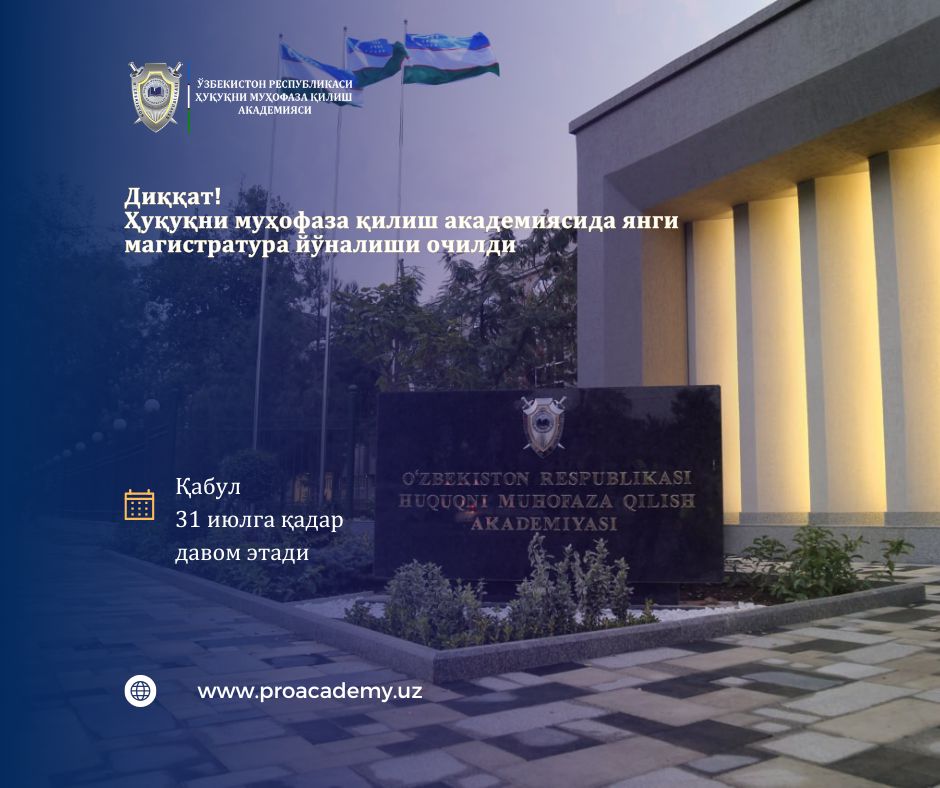Attention! A new master’s degree program has been launched at the Law enforcement academy
Admission to the master’s program at the Law enforcement academy is currently ongoing. We are pleased to announce that, starting from the current academic year, the Academy has introduced a new and relevant master’s degree specialization.
To further develop the digital economy, protect the rights of consumers of digital products and services, and strengthen efforts to combat offenses committed using digital technologies, a new one-year master’s degree program in “Legal support for cybersecurity” has been introduced at the Law enforcement academy of the Republic of Uzbekistan, starting from the 2025/2026 academic year. This initiative is implemented in accordance with Resolution of the President of the Republic of Uzbekistan, dated 22.01.2025 № RP-17, titled “On measures to introduce a system for training professional personnel in the field of combating crimes committed through digital technologies”.
In accordance with the aforementioned Presidential Decree, Resolution of the Cabinet of Ministers of the Republic of Uzbekistan, dated 12.06.2025 № 362 “On amendments and additions to certain resolutions of the Government of the Republic of Uzbekistan, as well as on the invalidation of certain”, introduced relevant changes and additions to Resolution of the Cabinet of Ministers of the Republic of Uzbekistan, dated 06.04.2023 № 143 “On measures to determine the procedure for admission and training in higher and postgraduate education programs at the Law Enforcement Academy of the Republic of Uzbekistan”.
Applicants for the master’s program in “Legal support for cybersecurity” are admitted on a competitive basis from among the following categories:
– individuals with a basic higher legal education in the field of Jurisprudence at the bachelor's level (hereinafter referred to as external candidates);
– employees of prosecution authorities with a basic higher legal education in Jurisprudence, including those in the personnel reserve, as well as employees of prosecution authorities with higher education in other specialties and at least 5 years of work experience in prosecutorial bodies (hereinafter referred to as internal candidates);
– employees of authorized state bodies with a basic higher legal education in Jurisprudence.
Additionally, if candidates for this specialization possess international IT certificates approved by the Ministry of digital technologies, they are exempt from the exam in “Computer science and information technologies” conducted by the Agency for Knowledge and Qualification Assessment under the Ministry of higher education, science, and innovation of the Republic of Uzbekistan, and are awarded the maximum score for that subject.
For reference: the list of international IT certificates approved by the Ministry of digital technologies is published on the official website of the Law enforcement academy.
In addition, students enrolled in the full-time program for this specialization will retain their salary (monetary allowance) from the wage fund in accordance with their most recently held position.
Additionally, in accordance with the latest amendments to the Resolution of the Cabinet of Ministers dated April 6, 2023, No. 143, employees of authorized state bodies who hold a basic higher legal education in the bachelor's degree field of Jurisprudence and do not possess a national or international certificate confirming their level of foreign language proficiency are allowed to enroll based on the results of foreign language tests conducted by the Agency for knowledge and qualification assessment.
In this regard, starting from the 2025/2026 academic year and within the framework of the approved admission parameters, employees of authorized state bodies will be eligible to participate in the competitive selection process for admission to the Academy’s master’s programs in “Prosecutorial activity” (distance learning format) and “Legal support for cybersecurity”.

